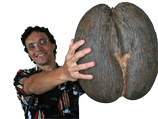Red Herring #5 and its Consequences
Upon hearing the word “alien”, most people conjure up an image of something extra-terrestrial – UFOs, ET or perhaps little green men such as Kang and Kodos from the Simpsons (as shown in the above cartoon). Perhaps they will whistle the Jeff Wayne’s ditty précised above. But, unless the person belongs to the small select world of biological invasions specialists, they are unlikely to think of… species introduced into new ecosystems directly or indirectly by people that increase in density and/or spread, to threaten ecosystems, habitats or species with economic, social or environmental harm!!
But even though the chances of anyone thinking of non-native species as aliens are practically a million to one … still they (the cognoscenti) come… to use the ‘A-word’. Unfortunately the term Invasive Alien Species (IAS) is with us now and it is not going away. So why do I feel so strongly about this “A-bomb?”
My first concern is that the use of the word alien causes confusion – a classic red herring. When the word alien is brought up for the first time during meetings I have facilitated, people inevitably talk about little green men; sometimes as a flippant aside, sometimes because they have an interest in extra-terrestrial life, and sometimes because they share my concern about the A-word being a red herring.
To be honest, such discussions are more water bomb than atomic bomb when you have a few minutes available for the bomb disposal process. My approach is to explain that the term 'Invasive Alien Species' is widely used in the discipline so we need to be aware of its existence. I then introduce my preferred alternatives such as 'exotic invasive species', a term I don’t care that much for either - because the word exotic conjures up stereotypically positive images (smiling twenty-somethings sipping piña coladas while lounging in a hammock under the tropical sun, … you get the picture), or 'non-native invasive species' – my personal preference. But ideally I would simply use the term 'invasive species' to which you can add non-native or native whenever pertinent (more on that later).
Job done? Well not quite. The problem is that the A-word is so ubiquitous in the scientific literature that it ends up being passed on unadulterated when communicating with non-experts. Without an explanation of the kind given above, the previously contained red herring can once more rear its ugly head. The narrator Edward Norton uses the term invasive alien species throughout the National Geographic documentary Strange Days on Planet Earth – Invaders, a programme targeted at a lay audience. Postings from those who were clearly confused and distracted by the A-word peppered the comments section of YouTube. Typical comments included I think they need to be careful when calling plants "aliens" because ... plants aren't aliens....., and I didn’t know termites were from another planets and there invading human civilization using highly complicated military tactics. Oh wait.” And “wtf with the term alien, dude. They evolved within this planet not from outer space...get it?
Things can get even more confusing when the word 'alien' is translated into different languages. Believe me; I have seen invasive alien species translated into les espèces envahissantes extraterrestres in the francophone world!!
My second, related, concern is the way in which the term invasive alien species or IAS has been used as a label for all invasive species, whether they are native or introduced. This is related to Red Herring #4 (Concern about species introductions is essentially racism) and the fact that some invasion biologists appear to pay insufficient attention to native species that can become invasive. In some cases it is necessary to distinguish between native and non-native invaders as this affects management. For instance, prevention at the national level will not be a part of the management toolkit for native invaders!
Some suggestions for addressing Red Herring #5
We are stuck with the A-word in certain quarters but it doesn't mean we should use it when communicating with lay audiences. Let’s try to raise awareness among experts of the fact that the word aliens does not work with the other 99.something percent of people who are not immersed in the world of biological invasions. Most biological invasions awareness-raising products produced nowadays do not use the A-word, which is encouraging. Explicit recognition of Red Herring #5 will help to reinforce this trend so that any references to 'aliens among us' are safely contained!



 RSS Feed
RSS Feed
